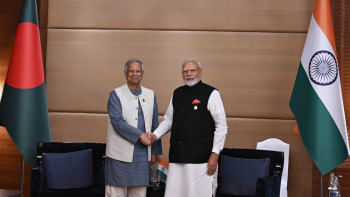India's unilateral 'push-ins' in Bangladesh a blow to already strained ties

We strongly protest India's action of pushing at least 123 individuals, including Rohingyas and Bangla-speaking people, into Bangladesh through the Kurigram and Khagrachhari border points. Reportedly, Border Guard Bangladesh (BGB) has detained these individuals and is currently verifying their identities, as they possess no IDs or passports. Furthermore, the BGB has issued a high alert along the border and lodged a strong protest note with India's Border Security Force (BSF), advising against such push-ins.
Flag meetings with the BSF have also been requested at various levels. Meanwhile, the Police Headquarters has alerted the superintendents of police in 31 bordering districts to ensure that our national security is not compromised amid the escalation of the India-Pakistan conflict. At a time when tensions between India and Pakistan have reached their highest point in years, it is shocking that India would choose this moment to push individuals into Bangladesh without consulting the Bangladeshi authorities.
We must say that there is no basis in international law for such unilateral "push-ins." In fact, it is entirely contrary to accepted diplomatic norms. Why did India not consult the Bangladeshi government before deciding to send these people? This is a question Bangladesh must raise. At the same time, our border security forces must remain on high alert.
Out of these individuals, 44, including 35 Rohingyas, were detained from the Roumari and Bhurungamari upazilas of Kurigram—30 in Roumari and 14 in Bhurungamari. Meanwhile, in Khagrachhari, at least 79 additional Bangla-speaking individuals were detained after being pushed in through three border points—27 at the Shantipur border in Matiranga upazila, 22 at the Taitong border in Dighinala upazila, and 30 at the Panchhari border in Panchhari upazila. According to a resident of Shantipur who had sheltered one of the individuals arriving from India, these people were flown from Gujarat to Agartala and then forcibly pushed across the border. They were also reportedly warned by BSF personnel never to return, or they would be shot.
We must say that there is no basis in international law for such unilateral "push-ins." In fact, it is entirely contrary to accepted diplomatic norms. Why did India not consult the Bangladeshi government before deciding to send these people? This is a question Bangladesh must raise. At the same time, our border security forces must remain on high alert. After all, we still do not know the identities of the individuals who have been pushed in. Moreover, it remains unclear whether India intends to carry out further push-ins—including of Rohingyas from Myanmar—into Bangladesh in the future.
In their interactions with Indian officials, Bangladesh authorities must make it clear that any such action must involve consultation with the local authorities first. No unilateral decision that threatens our national security, sovereignty, or territorial integrity can be accepted.


 For all latest news, follow The Daily Star's Google News channel.
For all latest news, follow The Daily Star's Google News channel. 










Comments